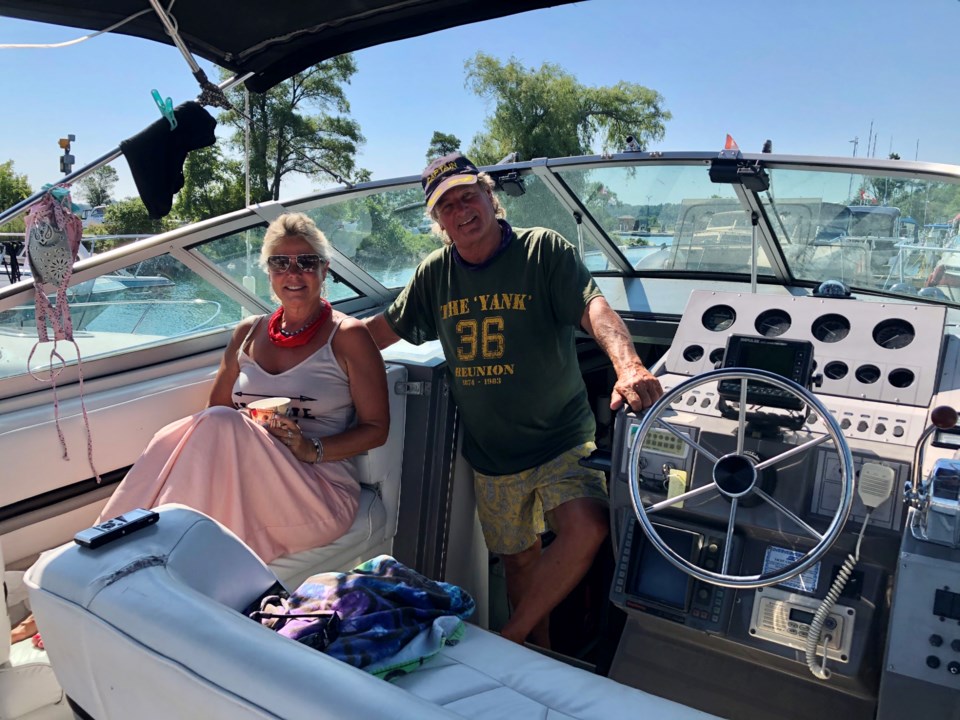Steve Barkey and Cathy Kolsh are now comfortably ensconced in their summer living quarters — his 30-foot cruiser docked at the Barrie Marina.
Getting here was a bit of a precarious journey that finally ended with the cross-border couple arriving at their destination a month or so late.
“We’ll just not be separated again,” said Kolsh, while having her morning coffee aboard Sea Alice before venturing out to spend the day with other boaters along a sandbar on the west side of Kempenfelt Bay.
“I don’t like feeling like I’m trapped between two borders. If I need to go back to family, am I going to have problems coming back? We don’t know, it’s just day-by-day.”
Kolsh, who’s from San Francisco, and Barkey, whose family is in Barrie, have been exploring different ways to prove they are a common-law couple so they can remain together if they ever encounter another stressful situation like they did in the spring.
The two live in a recreational vehicle, travelling the continent chasing the sun and connecting with friends they’ve met on their adventures. In the fall, they head south and see her family and then fly to the Honduras for the winter, returning to their RV before making their way back north.
This year, when they arrived at the North Dakota/Saskatchewan border, they were told it was closed because of the pandemic and they could only cross together if they could prove they’re a legally recognized couple.
Without any bills with addresses or much other paperwork showing that they live together in a common-law relationship, Kolsh, an American, was refused entry into Canada. When the two turned around to go back into the United States together, Barkey, a Canadian, was refused entry.
And, suddenly, they were separated.
For more than two weeks, he went into isolation in the RV on a friend’s Saskatchewan farm while she spent days trying to make it back to California where she regrouped, trying to figure out how she could be back with Barkey.
Then they scrambled to ensure her next attempt to come into Canada would be successful, getting all the paperwork, pictures and any other evidence they could gather to prove that they are indeed a common-law couple. They even sought legal advice.
Despite their worst fears, they managed to convince border security during that second attempt that they are indeed a couple and they were able to reunite. After isolating on the farm for another two weeks, this time together, they finally headed east, enjoying the company of friends along the way.
Now they’re in Barrie on the water, surrounded by good company and even enjoying the occasional rain on the roof of their vessel.
And since going public with their travails, they’ve discovered they’re not alone. Other cross-border couples have reached out for help, support and advice. They’ve also been approached by a local documentary filmmaker who is doing a podcast series about the trials and tribulations of cross-border couples during the pandemic.
Their goal is to continue to live day-to-day and their lifestyle is largely about chasing the sun, which means come winter, they plan not to be in Barrie. They have absolutely no desire to buy winter clothes, or even closed-toe shoes.
“In my positive thoughts of the universe, that’s not going to happen,” said Kolsh. “Things are going to get better, things are going to happen, the world’s going to calm down and we’re going to get healthier and we can go about our lives.”
And staying in the positive realm, Barley said he’s researching Canada’s warm regions, like the Okanagan Valley in British Columbia, if the pandemic once again prevents them from crossing into the United States together.
Another option is simply to find a country — a warm one, of course — where they could be together because they have no interest in ever being apart.
“We don’t intend to let ourselves be separated again,” declared Kolsh.



